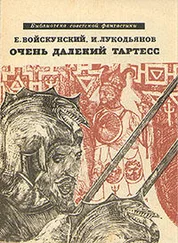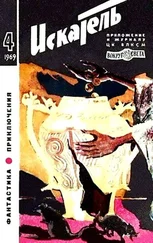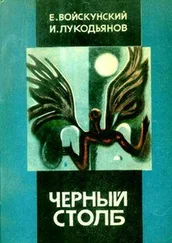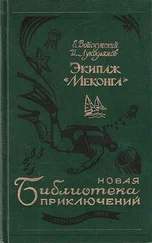Исай Лукодьянов - The Black Pillar
Здесь есть возможность читать онлайн «Исай Лукодьянов - The Black Pillar» весь текст электронной книги совершенно бесплатно (целиком полную версию без сокращений). В некоторых случаях можно слушать аудио, скачать через торрент в формате fb2 и присутствует краткое содержание. Город: Moscow, Год выпуска: 1968, Издательство: MIR Publishers, Жанр: Фантастика и фэнтези, на английском языке. Описание произведения, (предисловие) а так же отзывы посетителей доступны на портале библиотеки ЛибКат.
- Название:The Black Pillar
- Автор:
- Издательство:MIR Publishers
- Жанр:
- Год:1968
- Город:Moscow
- ISBN:нет данных
- Рейтинг книги:3 / 5. Голосов: 1
-
Избранное:Добавить в избранное
- Отзывы:
-
Ваша оценка:
- 60
- 1
- 2
- 3
- 4
- 5
The Black Pillar: краткое содержание, описание и аннотация
Предлагаем к чтению аннотацию, описание, краткое содержание или предисловие (зависит от того, что написал сам автор книги «The Black Pillar»). Если вы не нашли необходимую информацию о книге — напишите в комментариях, мы постараемся отыскать её.
© god54
The Black Pillar — читать онлайн бесплатно полную книгу (весь текст) целиком
Ниже представлен текст книги, разбитый по страницам. Система сохранения места последней прочитанной страницы, позволяет с удобством читать онлайн бесплатно книгу «The Black Pillar», без необходимости каждый раз заново искать на чём Вы остановились. Поставьте закладку, и сможете в любой момент перейти на страницу, на которой закончили чтение.
Интервал:
Закладка:
Will was bathing in the "swimming pool"-a small drop of the ocean enclosed in an anti-shark net. At a quarter past seven on the dot he would get out of the lift, puffing and blowing, and say: "The water's very warm today." In Will's lean body there was a clockwork spring that had been wound up once and for all.
Kravtsov put some butter in the porridge, salted it, made tea, and emerged from the galley just as Will came on deck. Kravtsov greeted him with a languid salute. Will nodded, pulled a white rubber swimming-cap off his head, wiped the water off his bronzed body with the palms of his hands, and said:
"The water's very warm today."
"Who'd have thought it," growled Kravtsov.
They breakfasted under an awning. Will seemed not to notice the buckwheat porridge. He cut himself a slice of bread, covered it with a thick piece of ham, and poured out a cup of tea and rum.
"You ought to have some porridge," said Kravtsov.
"Thank you. Another time," answered Will imperturbably. "What sort of a night did you have?"
"Bad. I had nightmares."
''Don't read Esperanto before going to bed."
"It's better to study Esperanto than make horrible gnomes from plasticine."
"Aye," said Will, sipping his tea and rum. "I haven't managed to model you yet. Perhaps because I can't quite picture your spiritual being clearly."
"My spiritual being?" Kravtsov grinned and glanced at Will's grizzled slop cropped head. "Shall I tell you a story? The hare asked the deer. 'Why do you wear such a heavy thing on your head?' 'What do you mean-why?' replied the deer. 'To look handsome, of course. I can't stand those who go about empty-headed.' The hare was offended and said 'Ah! But my inner life is very full.' "
Silently Will filled his pipe with light tobacco, but Kravtsov saw by the way his eyes puckered that he was reflecting on the story.
"Now I'll tell you one," said Will, enveloping himself in smoke. "An Irishman fell into the clutches of a bear. 'Do you want to eat me?' he asked. The bear answered 'Yes, I'm going to eat you up.' Then the Irishman said 'But how can you eat me without a fork?' The bear was very vain and didn't like to admit that he didn't know what a fork was. He thought and thought, and then said 'Yes, you're right' and let the Irishman go."
"Is that all?"
"Aye, that's all."
Kravtsov sniggered.
"The cable's slackened fifteen millimetres," he said after a silence.
Will knocked the ashes out of his pipe and spat into a box of sand.
"Let's go below, laddie." And with that he stood up and unhurriedly made his way to the derrick.
Kravtsov followed him, eyes fixed on his strong hairy legs and the neat crease in his pale green shorts.
They raised a heavy hatch in the deck and lowered themselves under the floor of the derrick. It was dark and stuffy there. Kravtsov switched on the light.
Before them was the upper end of the casing, topped with a set of preventers through which the drill passed. (Preventers-powerful valves hermetically sealing either the whole borehole or the annular space between the drill pipe and the casing, against a blowout of subterranean gases.)
Will stood lost in thought for a moment then climbed on to the upper flange, took out a rule, and measured the distance to the rotor beams.
"Well, what have you found?" asked Kravtsov.
Will jumped down, examined the preventers again, and began to hum an old Scottish ballad.
"Well, what?" said Kravtsov, beginning to lose patience.
"Well, I installed those preventers myself six years ago. And I'm damned if the casing hasn't risen a good six inches!"
"Are you quite sure what it was, Will?"
Will remained silent. He never answered such questions.
II
Six years before, in accordance with decision of the IGY-the International Geophysical Year-an ultra-deep borehole was started here, in the ocean trench, in order to study the composition of the Earth. All the countries taking part had contributed towards the construction of a floating base. Four drilling crews, selected by an international commission, were installed on the rig. They were all experienced off-shore oilmen, but it was the first time they had had to drill to a depth of fifty kilometres. True, the ocean deep saved them over ten kilometres, but even so forty kilometres was no joke.
For the first time a drill was to penetrate the envelope of the Earth under the crust-the mysterious mantle here, below the bed of the ocean, where the Mohorovicic discontinuity-the zone of property changes-most nearly approached the surface of the planet.
The very latest in world technique was used to drill the hole. The metal casing, made of a specially durable alloy, was not sunk as far as the face: it passed through the water and penetrated the sea bottom to a depth of only a few kilometres. Beyond that the wall of the well was not reinforced with metal: the thermoplasmic method of drilling, which reduced the rock to a gas, at the same time fused the wall and made it solid and leak-proof, protecting it against caving in and sealing it tightly against any water-bearing strata encountered.
The drill string went down this well to unexplored depths. The pipes were not coupled together in the usual way by threaded clamps. A high-frequency automatic welder welded them together almost instantaneously as they were being lowered. And when they were raised they were separated at the joints by an automatic plasma cutter.
If the whole borehole had been drilled by the thermoplasmic method, the operation would have been accomplished in a comparatively short time, "at one go", as it were. But the object was not the drilling itself, but the regular taking of samples of rock from every stratum encountered. For that reason it was necessary from time to time to use the old-fashioned rotary method, flushing the face with a weighted mud fluid; and only a slow core bit with diamond teeth could cut samples of rock in its pure natural state with the angle of bedding of the stratum clearly discernable, and with their natural porosity, saturation, and numerous other indices of importance to geologists, intact.
When rotary drilling was resorted to instead of electric and turbodrills, the whole enormous drill string was rotated. It was only possible to use a rotary table at such depths because the drill pipes were made of a special new type of light and durable alloy.
The holy of holies of the rig was the "core store", where the long cylinders of rock drilled out by the bit lay in rounded trays on numbered shelves. This repository occupied fully half of the middle deck. Here too was a laboratory for examining the samples. Some of the information had to be obtained immediately the cores were brought to the surface; then they were preserved for further analysis by washing them with a solution that rapidly polymerised into a transparent plastic.
Many times the drill string was raised and the geologists slowly spelled out-letter by letter- the marvellous story of the depths and racked their brains over its riddles.
But at forty-two kilometres drilling came to an abrupt halt. Down below, the hundred-thousand-degree plasma-electron-nuclear gas-roared and beat against the face. The needles on the instruments had gone as far as they could to the right, but it was of no use: the plasma drill head, which had so far known no barriers, had come up against some insurmountable obstacle.
It was decided to raise the drill string and examine the head, but it was immovable: something-but what, no one understood-was holding it in the well.
That was when one of the drillers, Ali-Ovsad Ragimov, from Baku, made a remark that subsequently became famous: "Just like a Karabakh ass-it won't go forward or back."
The drillers struggled for several weeks trying to overcome the resistance of the rock or to raise the gigantic drill string. The world's best geologists argued in the messroom of the floating island about this incomprehensible phenomenon. All in vain. The borehole, which went down to an inconceivable depth, refused to yield its secret to man.
Читать дальшеИнтервал:
Закладка:
Похожие книги на «The Black Pillar»
Представляем Вашему вниманию похожие книги на «The Black Pillar» списком для выбора. Мы отобрали схожую по названию и смыслу литературу в надежде предоставить читателям больше вариантов отыскать новые, интересные, ещё непрочитанные произведения.
Обсуждение, отзывы о книге «The Black Pillar» и просто собственные мнения читателей. Оставьте ваши комментарии, напишите, что Вы думаете о произведении, его смысле или главных героях. Укажите что конкретно понравилось, а что нет, и почему Вы так считаете.








